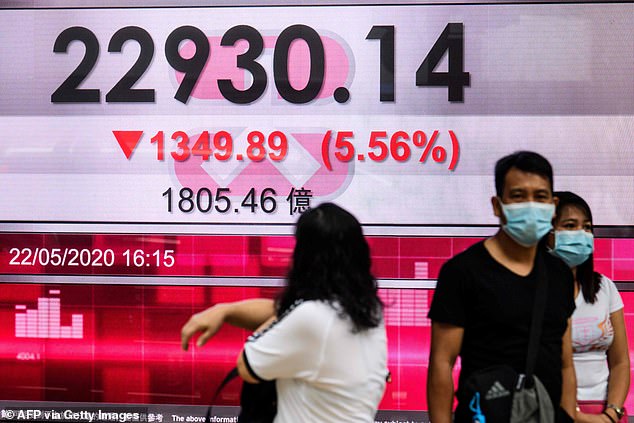KEY POINTS

- Hong Kong’s Hang Seng index plunged 5.56% by the close on Friday.
- China is poised to impose a new national security law on Hong Kong after months of anti-government protests in the territory. The move has sparked worries that Beijing is tightening its grip on Hong Kong.
- China also announced at its annual parliamentary meeting that it will not set a GDP target for 2020.
- That comes as tensions between Beijing and Washington have risen in recent days.
Stocks in Asia Pacific fell on Friday as rising tensions between the U.S. and China weighed on investor sentiment.
Hong Kong’s Hang Seng index led losses among the region’s major markets as it plummeted 5.56% to close at 22,930.14.
China is poised to impose a new national security law on Hong Kong after months of anti-government protests in the Chinese-ruled city. The move has sparked concerns that Beijing is tightening its grip on Hong Kong, and there are worries it could trigger another wave of pro-democracy protests.
The draft law was announced at the annual National People’s Congress (NPC), the Chinese parliament, which kicked off on Friday.
The laws would reportedly ban secession, foreign interference, terrorism and all seditious activities aimed at toppling the central government and any external interference in the former British colony.
“Justifiably, the Hong Kong Security bill on the agenda for the NPC in Beijing today evokes insecurity in the markets; as risks of US China conflict and renewed Hong Kong protests grow,” analysts at Mizuho Bank said in a note.
Acknowledging that the development was a “source of concern,” OCBC Bank’s Vasu Menon told CNBC’s “Street Signs” that the last few years have shown that political developments “don’t have a significant impact” in the medium to long term unless they result in an economic impact.
“For now of course it’s grabbing headlines, but we’ve seen this happen before and while it might impact the Hong Kong market, I’m not sure whether it will spillover into the rest of Asia, rest of the world unless it’s results in a significant economic impact as Covid-19 has,” said Menon, who is executive director of investment strategy, wealth management Singapore at OCBC Bank.
Mainland Chinese stocks also declined on the day, with the Shanghai composite down 1.89% to approximately 2,813.77 while the Shenzhen component shed 2.22% to 10,604.97.
Elsewhere, the Nikkei 225 in Japan closed 0.8% lower at 20,388.16 while the Topix index ended its trading day 0.9% lower at 1,477.80. Over in South Korea, the Kospi fell 1.41% to close at 1,970.13.
Shares in Australia also declined, with the S&P/ASX 200 closing 0.96% lower at 5,497.
Overall, the MSCI Asia ex-Japan index dropped 2.68%.
China said it will not set a GDP target for 2020.
“I would like to point out that we have not set a specific target for economic growth this year,” Chinese Premier Li Keqiang said in an English-language text of the work report delivered on Friday. “This is because our country will face some factors that are difficult to predict in its development due to the great uncertainty regarding the Covid-19 pandemic and the world economic and trade environment.”
That comes as tensions between Beijing and Washington have risen in recent days, over issues such as the coronavirus pandemic as well as a bill that was passed which could force Chinese firms to delist on U.S. exchanges.
“The temperature of US China tensions are rising and taking a bite out of risk sentiment everywhere, albeit only modestly so at this stage,” Ray Attrill, head of foreign exchange strategy at National Australia Bank, wrote in a note.
Oil prices plunge
Oil prices dropped in the afternoon of Asian trading hours, with international benchmark Brent crude futures down 5.46% to $34.09 per barrel. U.S. crude futures also fell 6.69% to $31.65 per barrel.
The U.S. dollar index, which tracks the greenback against a basket of its peers, was at 99.77 after seeing a decline this week from levels above 100.
The Japanese yen traded 107.48 per dollar, off lows around 108 seen earlier in the trading week. The Australian dollar changed hands at $0.6522 after touching levels above $0.658 yesterday.
The onshore Chinese yuan broke the 7.13 level against the greenback on Friday. That was its weakest since October 2019, according to Wind Information. It later recovered from those lows and was last at 7.1276 per dollar.
CNBC

Leave a Reply
You must be logged in to post a comment.